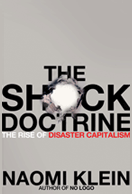The Shock Doctrine

Disaster Capitalism in Action: banks
100 Former Govt Employees Now Working as Bank Lobbyists on Bailout
Daniel Schulman and Jonathan Stein, Mother Jones, April 9, 2009
"In late March, as public outrage over bonuses paid to executives of bailed-out financial firms exploded, Citigroup CEO Vikram Pandit met with Senate majority leader Harry Reid. Accompanying the under-fire CEO to the meeting was Jimmy Ryan, one of the banking conglomerate's top in-house lobbyists. Ryan was a familiar face to Reid and his staff. Up until 2003, he was the Nevada senator's chief counsel, and since then he has remained close to Reid. The senator, according to Reid spokesman Jim Manley, merely discussed with Pandit the financial state of Citigroup and the economy in general. If Pandit and Ryan had hoped that Reid would take action to benefit their company, Manley maintained, this effort was unsuccessful.
"Whether or not Ryan was able to win any sympathy (or anything else) from his old boss, the episode highlights one aspect of Washington bailout politics: Financial firms seeking big bucks and favorable terms from Congress and the White House are deploying Capitol Hill aides turned lobbyists to win favorable treatment from the congressional lawmakers who are managing various aspects of the financial recovery—overseeing or appropriating nearly $3 trillion in spending and lending. And some lawmakers—including Sen. Chris Dodd (D-Conn.), the chairman of the Senate banking committee—have declined to disclose whether they have had contact with former aides now lobbying for the financial sector.
"Corporations hiring departed congressional staffers as lobbyists is a ho-hum practice on K Street. But the stakes are particularly high when these Capitol Hill vets are sicced on programs and legislation that are crucial to the country's financial recovery and that involve massive amounts of government spending. In the past year, top bailout recipients, from Goldman Sachs to Bank of America to JPMorgan Chase, have dispatched more than 100 past congressional staffers and ex-government officials to shape the bailouts to their liking. This crew of well-connected lobbyists includes ex-employees of the congressional committees on banking, finance, and commerce; one-time aides to Democratic and Republican leaders; former Treasury officials; and a past aide to Rahm Emanuel, now the White House chief of staff."
After Lobbying for Years, Banks Likely to Achieve Accounting Rules Change
Ian Katz and Jesse Westbrook, Bloomberg News, March 30, 2009
"Four days after U.S. lawmakers berated Financial Accounting Standards Board Chairman Robert Herz and threatened to take rulemaking out of his hands, FASB proposed an overhaul of fair-value accounting that may improve profits at banks such as Citigroup Inc. by more than 20 percent.
The changes proposed on March 16 to fair-value, also known as mark-to-market accounting, would allow companies to use 'significant judgment' in valuing assets and reduce the amount of writedowns they must take on so-called impaired investments, including mortgage-backed securities. A final vote on the resolutions, which would apply to first-quarter financial statements, is scheduled for April 2....
“What disturbs me most about the FASB action is they appear to be bowing to outrageous threats from members of Congress who are beholden to corporate supporters,” said [former SEC Chairman Arthur] Levitt, now a senior adviser at buyout firm Carlyle Group....
"Conrad Hewitt, a former chief accountant at the SEC who stepped down in January, said representatives from the ABA, American International Group Inc., Fannie Mae and Freddie Mac all lobbied him over the past two years to suspend the fair- value rule. Executives 'would come to me in the afternoon with the argument, "You've got to suspend it,"' Hewitt said in a March 25 interview. The SEC, which oversees FASB, would reject their demands, and “the next morning their lobbyists would go to Congress,” he said.
Update on April 2: Government Gives in to Pressure and Eases Mark to Market Rules, Bloomberg News
Citigroup May Spend $10 Million for Executive Suite
Erik Schatzker, Bloomberg News, March 19, 2009
"Citigroup Inc. plans to spend about $10 million on new offices for Chief Executive Officer Vikram Pandit and his lieutenants, after the U.S. government injected $45 billion of cash into the bank.
"Affidavits filed with New York’s Department of Buildings show Citigroup expects to pay at least $3.2 million for basic construction such as wall removal, plumbing and fire safety. By the time architect’s fees and expenses such as furniture are added, the tally for the offices at the bank’s Park Avenue headquarters will be at least three times as high, according to a person familiar with the project who declined to be identified because he’s not authorized to comment. Citigroup said the project will help it save money over time....
"Plans and instructions for the bank’s contractors, on file with the city, specify the installation of at least one Sub-Zero Inc. refrigerator and icemaker in the renovated space, along with “premium grade” millwork and Madico Inc. “Safety Shield 800” blast-proof window film."
Banks Receiving TARP Funds Owe More Than $220M in Back Taxes
Matt Jaffe, ABC News, March 19, 2009
"At least 13 companies who have received some of the $300 billion in TARP funds owe hundreds of millions of dollars in back taxes, it was revealed today.
"Two of the companies owe more than $100 million in taxes, said Rep. John Lewis, D-Ga., chairman of the House Ways and Means Subcommittee on Oversight. Altogether, the 13 companies owed the government more than $220 million in unpaid taxes, he said.... He didn't identify the companies or indicate how much TARP money they have received. But some of the corporations that have received the largest chunks of TARP cash include AIG, Bank of America, Citigroup, General Motors and Chrysler."
Merrill Lynch's Executives Made Millions in 2008 While the Firm Lost Billions
Reuters, Reuters, March 4, 2009
"Merrill Lynch & Co's 10 highest-paid employees got a total of $209 million in cash and stock in 2008, up slightly from $201 million they received a year earlier, the Wall Street Journal said, citing reviewed figures.
"Andrea Orcel, the firm's top investment banker, was paid $33.8 million in cash and stock in 2008, the paper said... Eleven top executives were paid more than $10 million in cash and stock last year, the paper said, citing people familiar with the situation. Another 149 received $3 million or more, the paper said."
Bailed Out Banks Still Spend Billions on Campaign Donations
Silla Brush, The Hill, March 3, 2009
"The eight largest banks’ political action committees (PACs) spent roughly $225,000, not including operating expenses, between Nov. 25 and the end of January, according to a review of year-end and February filings with the Federal Election Commission. Those same eight banks have received $170 billion of the government’s $700 billion financial rescue package, passed in October and currently being reworked by President Obama’s administration....
"JPMorgan Chase & Co., which received $25 billion in bailout money last fall, was the largest bank contributor in the last two periods. The firm’s PAC spent roughly $87,000 since Nov. 25, including $5,000 to former Sen. Norm Coleman (R-Minn.), $5,000 for debt retirement to Sen. Mark Warner (D-Va.), $15,000 to the National Republican Senatorial Committee and $5,000 to the New Democrat Coalition PAC....
"Some of the leading trade associations representing the financial industry also have given hundreds of thousands since mid-November. The American Bankers Association PAC spent $132,000, and the Independent Community Bankers Association spent $106,000. The Securities Industry and Financial Markets Association PAC spent only $1,000, and the Financial Service Roundtable PAC spent roughly $17,000."
SEC to Examine Boards' Role in Financial Crisis
Zachary A. Goldfarb, Washington Post, February 20, 2009
"Securities and Exchange Commission Chairman Mary Schapiro plans to look into whether the boards of banks and other financial firms conducted effective oversight leading up to the financial crisis, according to SEC officials, part of efforts to intensify scrutiny of the top levels of management and give new powers to shareholders to shape boards.
"As she examines what went wrong, Schapiro is also considering asking boards to disclose more about directors' backgrounds and skills, specifically how much they know about managing risk, said the officials, who spoke on condition of anonymity because no policy initiative has been launched....
"The boards signed off on the risks the companies took and the compensation packages awarded to top executives. But many corporate watchdogs say the boards of top financial firms had characteristics that promoted risky business practices and harmed shareholders....
"Watchdogs point to flawed boards at many firms -- including Countrywide, American International Group and Wachovia -- involved in the crisis. [Nell] Minow points out that at Bear Stearns, the compensation committee had nine criteria to decide on the chief executive's compensation, such as total return to shareholders and earnings per share. But in the end, it could choose to award the maximum compensation to the chief executive based on only one of the criteria."
UK Cuts Bonuses to Bailed Out Banks by More than 90%
Gonzalo Vina and Jon Menon, Bloomberg News, February 17, 2009
The U.K. government will cut bonuses at Royal Bank of Scotland Group Plc by more than 90 percent and eliminate them for many executives in a bid to end 'rewards for failure.' Executives responsible for the bank’s record 28 billion pound ($40 billion) 2008 losses will receive no bonuses, a Treasury spokesman said. Britain’s biggest government-owned bank said it will impose a pay freeze for directors and executives, and all other pay rises will be below the rate of inflation.
"The same principles on bonuses will apply to Lloyds Banking Group Plc, 43 percent government-owned, Chancellor of the Exchequer Alistair Darling said. 'Don’t reward failure,' he told Sky News today. 'That’s as good for Lloyds as it is for RBS,' he said."
Largest Banks That Received Aid Cut Lending
Christopher S. Rugaber, Associated Press, February 17, 2009
"The 20 largest banks that received government rescue funds slightly reduced their lending to consumers and businesses in the last three months of 2008, the government said Tuesday.
"The Treasury Department said the banks reduced their mortgage and business loans by a median of 1 percent each, while credit card lending rose by a median of 2 percent. The median is the point halfway between the banks that lent the most and those that lent the least.
Morgan Stanley, Citigroup to Give Brokers Big Retention Fees
Aaron Lucchetti, Wall Street Journal, February 14, 2009
"Building the biggest brokerage firm on Wall Street is proving costly to Morgan Stanley and Citigroup Inc., which are planning to pay brokers about $3 billion to keep them from being poached away from the joint venture, people familiar with the matter said.
"While the terms aren't expected to be announced until later this month, the issue could grow politically sensitive, because the U.S. government holds stakes in Citigroup and Morgan Stanley as part of its bailout of the financial system. Morgan Stanley is paying Citigroup $2.7 billion to take control of the joint venture, which was announced last month and will combine its brokerage operation with Citigroup's Smith Barney unit....
"The pay packages, ranging from 50% to about 260% of a broker's annual production, are rubbing some the wrong way, especially at a time when financial-services firms have taken government money and many of the brokers' clients are suffering losses. Depending on the size of the individual broker's business, the payments can exceed $10 million."














